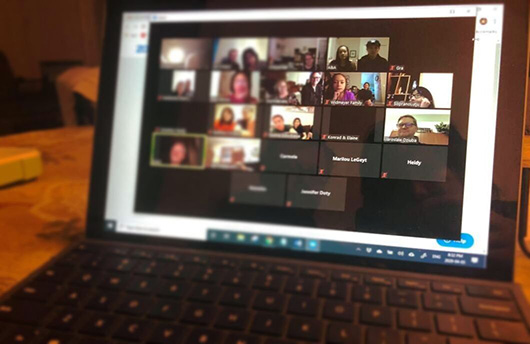Psychology Professor Offers Advice on Beating Zoom Fatigue

Online meetings certainly have benefits, including less formal attire and less formal settings. However, there also are disadvantages. Most of those are obvious, including inconsistent video and audio connections, lag time in audio, and frozen computer screens.
But there's one drawback that might not be as obvious: Zoom fatigue.
"It's a thing," said Shanda Jenkins, an assistant professor of psychology at Thomas Nelson.
According to Zoom.com, about 10 million people participated in its online meeting tool daily in December 2019. Just three months later, in March 2020, that number had increased to 200 million.
"It's not something that is easily noticeable in meetings, but you do see it in behaviors that might be indicative of some fatigue," Jenkins said.
Some of those behaviors are less participation in meetings, people who don't want to get on camera, people who are clearly distracted, and differences in the way people interact during those online meetings.
"Zoom fatigue itself is not something you can necessarily observe," Jenkins said. "But I've definitely felt it."
She said since everyone has been so distant because of the coronavirus pandemic, people aren't having the same type of conversations in the office. There is much less water cooler talk, which can be an important office ritual.
But steps can be taken to avoid Zoom fatigue. The first, said Jenkins, is making sure the meeting is necessary.
"We've all been in meetings that could have been emails," she said.
If those meetings are a must, try not to schedule them back to back, and take breaks during long sessions, just as you would do in a long face-to-face meeting. In addition, try not to multitask during meetings.
"Human brains aren't really good at multitasking, but it is harder to focus in a Zoom meeting than it is in a face-to-face meeting," she said. "You just have to be aware of that. Try not to check your email, look at your social media and be at the meeting all at the same time."
She admits this might not be easy.
"What I've seen is sometimes it's harder to concentrate when you're in a Zoom meeting as opposed to a face-to-face meeting," Jenkins said. "It's also a lot more tempting to multitask."
In face-to-face meetings, the focus is on the meeting, not what's going on in the background.
"You're not thinking about what your kid is doing in the corner, whether or not the dog has eaten, and all the other things you have to do around the house," she said. "That part is a little more difficult."
One of the ways to combat that, according the experts, is to create a "home office," even if that is only in feel. Says Psychology Today: Change the lighting when you go "off-the-clock" and change the playlist and ditch the coffee mug from your desk. When you feel you're working 24/7 and are unable to leave the office to see friends, having tricks to help you feel that there's a boundary between work and play can be important.
Another subtle thing Jenkins suggests, especially in an academic environment, is allowing people the option not to be on camera.
"A lot of people in academia tend to be introverts, so being on constant camera is hard and it's a distraction," she said.
There are benefits to seeing someone's face when having a meeting, but giving participants the option, at least once in a while, can be beneficial.
All this doesn't mean there are no benefits to Zoom meetings, which provide a great way to stay connected to co-workers.
"People who are doing the quarantine thing right feel some kind of disconnection from other people," Jenkins said. "I miss my colleagues. I know it sounds corny, but I do. Being able to see them, being able to see what's going on with them, that they're alive and OK is important. So that's a good thing."
She noted research shows that when in these meetings, we focus on ourselves.
"You're looking at yourself. You're looking at how you're coming off to the other people in the meeting, and then when you are not focusing on yourself, you might be focusing on external things and other people's background," she said. "I can tell you so much about so many people's home environment."
But that can also be a good thing.
"I've also been in meetings where people will get the nice little digital backgrounds or do extra things to make the meeting more interesting and play games and such," Jenkins said. "Keeping that connection part is a good thing that comes out of Zoom … You get to see people in their natural environment. You get a glimpse of people's real lives outside of work."
When things return to normal, Jenkins predicts Zoom meetings won't go away. As a matter of fact, she's hoping the working world continues to take advantage of their positive effects.
"I think Zoom meetings can be very beneficial in a lot of ways," she said. "I think a good mix between face-to-face and online meetings will be great."
She even said Zoom meetings might make us more appreciative of face-to-face interaction.
"I can't tell you how many times I've heard from colleagues and from friends, 'I promise I'm not going to duck any more parties or meetings,'" Jenkins said. "All those things that we find an excuse not to go to and didn't really want to do … Now, everyone's going to be there. Everyone wants to go."
